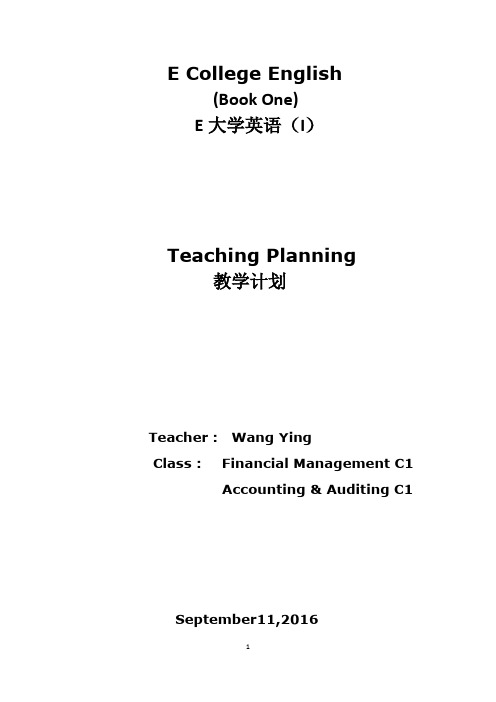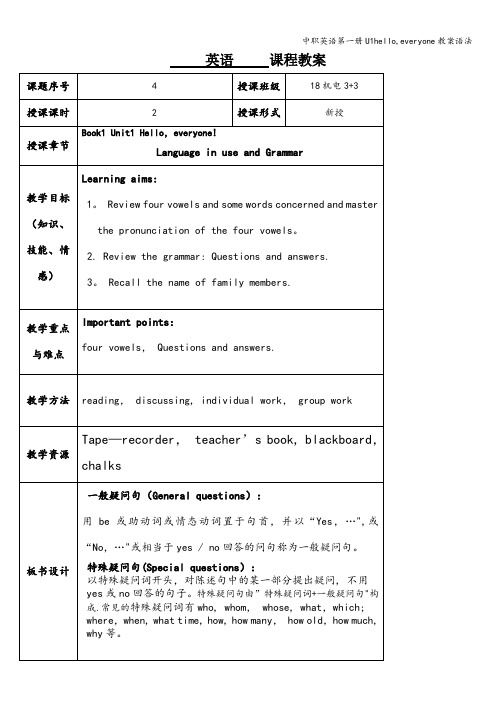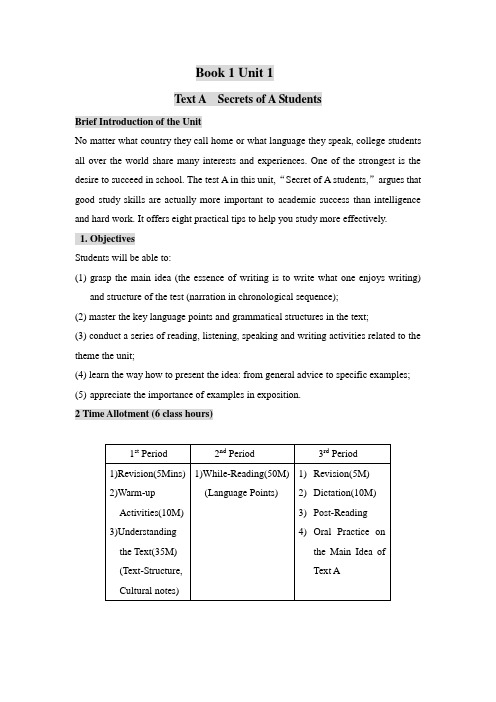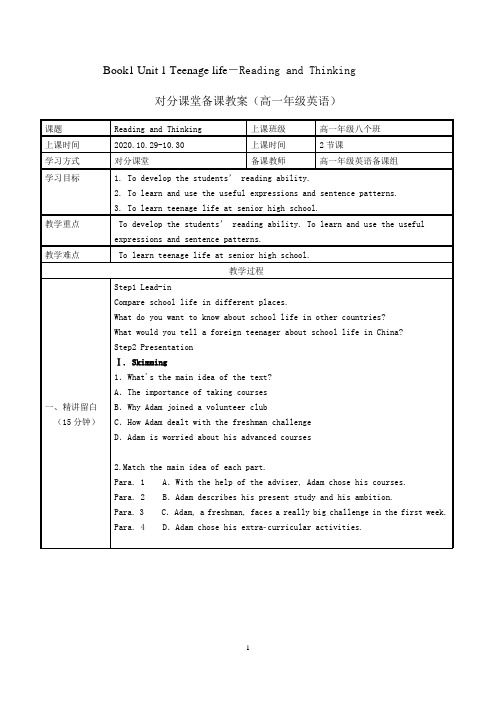book 1 unit 1 教案
E英语教程1 unit1教案

精心整理ECollegeEnglish(BookOne)E大学英语(I)nit;8.LearnculturerelatedII Teaching?Allotment?1.Listening?(45mins)?A.Skills:?listening?to?the?stressed?wordsB.Functions:?how?to?express?greetings?&response.C.Conversation?one:?D.Conversation?two?:?E.Practice:?conversation?one?and?two?and?exercises.?2.Speaking?(45mins)?A.Conclude?the?phrases?about?expressing?greeting&responseB.Role?-play?C.Activities:?role-play?several?situations?according?to?guided?conversation?D.?Discussion?after?listening:?E.Passage?listening?:?F.Discussion:?3.PassageAstudy(4sections):4.PassageBstudy(2sections):5.Exercise&grammarpractice(2sections):I’mgoingtohaveadinnerwithmyteachernextMonday4.wish:v.towantsth.tohappenalthoughitisunlikely但愿,希望Iwishitwouldnotraintomorrow.区分hope:Ihopeyouwillcometojoinus.填空:I——Icouldfly.5.sortof(副词短语)或多或少,有点儿,莫种程度,kindofIwillnotdothatsortofthingduringexamination.Itissortofboringtoattendthepoliticallecture.Themi nuteIcamein,I’msortofsorryI’dcome6.uptonow到目前为止为状语的句子时,谓语动词一般用现在完成时,表示从过去某时到现在这一段时间里已发生的事。
(完整版)E英语教程1unit1教案

E College English(Book One)E大学英语(I)Teaching Planning教学计划Teacher : Wang YingClass : Financial Management C1Accounting & Auditing C1 September11,2016Unit II Teaching objectives:1.Distinguish confusing pronunciations;2.Learn how to express greeting & response, making introductions & response;3.Improve reading skills;4.Grasp the main idea and the structure of the text;5. Master the key words and phrases and sentence patterns in the text;6.Practice grammar using in writing.7.Conduct a series of reading, listening, speaking related to the theme of the unit;8.Learn culture relatedII Teaching Allotment1.Listening (45mins)A. Skills: listening to the stressed wordsB. Functions: how to express greetings & response.C. Conversation one:D. Conversation two :E. Practice: conversation one and two and exercises.2.Speaking (45mins)A . Conclude the phrases about expressing greeting & responseB. Role - playC. Activities: role-play several situations according to guided conversationD. Discussion after listening:E. Passage listening :F. Discussion:3.Passage A study(4 sections):4.Passage B study(2 sections):5.Exercise & grammar practice(2sections):III Detailed study of text AA Mothe r’s Letter to the WorldLead-in (20 mins)A.Video watching & extended readingB.Warming-upQ1. Do you still remember what your parents told you when you started school ?What is it ?Q2. What are your parents’ expectation of you ? Have you realized them?Q3. What would you say to your parents when it is time for you to leavehome and start your own life?Q4. If it is time for your own child to go out into adult world, what would you say to him / her ?Language points.1. Title writing rules : A Mother’s Letter to the World(首字母大写,中间的虚词不大写)。
中职英语第一册U1hello,everyone教案语法

His six—year old sister is as fit as a fiddle.
注意:[i:]是长元音,发长元音时要比发短元音长两倍以上。
(2) [ǝ:]和[ǝ]的发音规则。
[ǝ:] 舌身平放,舌中部稍抬起。 牙床开得较窗窄,双唇和发[i:]时相似。
以特殊疑问词开头,对陈述句中的某一部分提出疑问,不用yes或no回答的句子。特殊疑问句由”特殊疑问词+一般疑问句"构成.常见的特殊疑问词有who, whom, whose,what,which;where,when,what time, how,how many,how old,how much, why等。
教学资源
Tape—recorder, teacher’s book, blackboard, chalks
板书设计
一般疑问句(General questions):
用be或助动词或情态动词置于句首,并以“Yes,…",或“No,…"或相当于yes / no回答的问句称为一般疑问句。
特殊疑问句(Special questions):
—-— Yes, she does. / No, she doesn’t.
④--—Are there any books on your desk?
——— Yes, there are。/ No, there aren’t。
2。特殊疑问句(Special questions):以特殊疑问词开头,对陈述句中的某一部分提出疑问,不用yes或no回答的句子。特殊疑问句由"特殊疑问词+一般疑问句”构成。常见的特殊疑问词有who, whom, whose,what,which;where,when,what time, how,how many,how old,how much, why等。
21世纪大学英语-课程教案-book1

Book 1 Unit 1Text A Secrets of A StudentsBrief Introduction of the UnitNo matter what country they call home or what language they speak, college students all over the world share many interests and experiences. One of the strongest is the desire to succeed in school. The test A in this unit,“Secret of A students,”argues that good study skills are actually more important to academic success than intelligence and hard work. It offers eight practical tips to help you study more effectively.1. ObjectivesStudents will be able to:(1)grasp the main idea (the essence of writing is to write what one enjoys writing)and structure of the test (narration in chronological sequence);(2) master the key language points and grammatical structures in the text;(3) conduct a series of reading, listening, speaking and writing activities related to the theme the unit;(4) learn the way how to present the idea: from general advice to specific examples;(5)appreciate the importance of examples in exposition.2Time Allotment (6 class hours)3 Warm-up Activities(1) Based on the title, guess what the text is about.(2) Arrange the students in group of 4-6, depending on the size of the class; each group elects a chairman, a recorder and a speaker, and introduce the discussion topics;(a) What does your group like or dislike about English?(b) What are the greatest problems your group has in English study?(c)What methods do you think are good in your English study?4Text StructuresThis text is divided into three parts.The first part (1-3paragraph) tells us why A students do well in their study, even if they actually put in fewer hours than their lower-scoring classmates.The second part (4-11) shows us secrets of A students which include eight skills; concentrate, study anywhere, organize your materials, organize your time, learn how to read, take good notes, ask questions, and study together.The third part is to encourage all the students to learn and master the secrets in order to become A students.5 Cultural notes1) grading systemSchool, colleges and universities in Great Britain and the United States commonly use letter grades to indicate the quality of a student’s academic performance: A(excellent), B(good), C(average), D(below average), and F(failing). In the United States, work rated C or above is usually required of an undergraduate student to continue his/herstudies; work rated B or higher is usually required of a graduate student to continue. In percentage scales, 100 percent is the highest mark, and 70 percent (or 65 percent) is usually the lowest passing mark.2) students at universitiesA university student who has not yet taken his or her first, or “bachelor’s” degree is an undergraduate. In the United States, a first-year student at a college or university, and in a high school as well, is called a freshman, a second-year student a sophomore, and a third-year student a junior, and a fourth-year student a senior. A student is a person who has completed a university degree course while a postgraduate (or graduate in the United States) is a person doing studies that are done at a university after one has received a first degree.6 Language Study1) Word-processingA) perform: (vi/t) do (a piece of work, sth one is order to do, sth one has agreed to do) 做,履行,完成; 演出,表演Examples:a)As a top student, she performs extremely well in every lesson.b)State-owned industries more often than not perform poorly.Derivative:a) performance:(n) [sing] process or manner of performing做,履行,完成; 演出,表演·To be faithful in the performance of his duties.Differences: act and performAct: 表示“充当、扮演或演出”,主要指演员在电影、戏剧中扮演角色,主语既可为演员,也可为电影、剧本等。
优秀教案pep小学英语三年级上册教案unit1-helloPartB-let's-learn

Unit 1 Hello 教案
P r a c t i c e 巩固练习1. 字母游戏:
Start to read.(第9页) 教师引导帮助学生观察、圈出相同的字母。
2. 单词游戏:
(1)找朋友:让几名同学分别拿着新授的单词卡片,另几名同学拿着单词的图片,各自记住自己的单词,如果教师说begin,
他们就可以口中边念着自己的单词,如:book... 边快速找
到自己的朋友,找到后可互相打招呼,如:Hello, book.
———_____
(2)猜一猜:根据儿童好胜的天性,可以让同学们对所学单词进行猜一猜活动,如:老师把新授的单词卡片中的任一张举在
上前比赛的两名同学的后面,让他们快速猜出是什么单词,
猜错的话可以继续往下猜,直到一名同学猜对为止,对猜对
的同学要给与表扬、奖励。
(3)数一数:教师帮助、指导学生完成课本第9页的Read and count.
2. 小组活动。
(1)小组表演:
六人一小组,将所学物品摆放在桌子上,2分钟内,小组长领导小组成员一起自由练习Let’s do 内容,教师给予指导。
(2)小组比赛:
教师运用TPR模仿各种动作让生说英语,之后交换;回答正确的同学可以为该组争得一个标志并运用TPR挑战其他小组。
【设计意图】图意结合教学法,由机械操练到意义操练;把游戏变成比赛激发学习兴趣。
高中英语新教材必修一Unit1 Reading and Thinking 教案

(5分钟)
Step4 Discussion
What are some differences between Adam's school life and your school life?
Differences:
No choice of courses
No social practice
topic
freshmen extra curricular quit
advance
fluent
sign up for
be responsible for
be good at
get used to
keep up with
be well prepared for
so that
it is+adj./n.+to do sth.
Book1 Unit 1 Teenage life-Reading and Thinking
对分课堂备课教案(高一年级英语)
课题
Reading and Thinking
上课班级
高一年级八个班
上课时间
2020.10.29-10.30
上课时间
2节课
学习方式
对分课堂
备课教师
高一年级英语备课组
学习目标
1. Todevelop the students’reading ability.
Para. 4 D.Adam chose his extra curricular activities.
二、内化吸收
(10分钟)
Step3 Assimilation
Ⅱ. Scanning
1.Which one of the following courses did Adam NOT choose?
职高英语基础模块1高等教育unit1教案第三课时

Book1 Unit 1 Nice to meet you!(第三课时教学设计)一、教材分析1.教学内容本课时系教材《英语1》(基础模块高教版)第一单元的第三课时,包括language in use和vocabulary consolidation两部分,具体内容为:be动词的用法和名片各栏目词汇的表达,职业词汇收集。
2.教学重点、难点⑴教学重点be动词的用法和主题词汇的积累,未来职业的描述⑵教学难点主题词汇的积累二、教学目标1.知识目标⑴掌握与名片设计相关的主题词汇,如name, first name; last name; name card; telephone number; age; address; e-mail address; job (engineer; manager; secretary; teacher; student; doctor; nurse; singer; fans); position(boss).⑵掌握be动词的用法。
(3)能描述自己或他人的职业。
2.能力目标⑴学生能清晰表达名片各栏目.⑵学生能熟练掌握职业词汇以及be动词的用法。
3.情感目标学生清楚自己的职业梦想,建立初步的就业意识。
三、教学步骤(英文)Step One Lead—in (10m)1。
Have a comment on the students’ name cards. Pass the cards around the class.(设计意图:教师及时对学生的作业作出评价,对优秀作业的集体肯定,可以促使学生更积极主动地做作业。
)2. Ask the students to present and talk about the name cards they have collected in groups。
Use the following sentence patterns。
His name is …He is from …He is a …His telephone number is …(设计意图:读懂名片信息,掌握动词be的用法之一:用is的情况.)Step Two Language in use (20 m)1.Game: Who am I? The teacher says “I'm thinking of something and you guess what it is.” The teacher can describe anything that the students are familiar with, however, the teacher should use “am”as many times as possible。
《英语》(新标准)高中修订版必修第一册Unit 1 教学设计

单元主题
本单元主题语境是“人与自我”,涉及的主题语境内容是高中起始阶段的日常学习与生活。本单元从介绍一所英国中学里学生的日常学习生活开始,依次呈现了中国男孩孟浩高中生活的第一天、学校里不同的俱乐部、美国女孩Lisa总结的高中学习与生活建议等学习内容,帮助学生全面了解高中日常学习与生活的基本情况,使学生意识到初、高中学习生活的不同,引导学生合理规划、安排高中生活,并在一定程度上了解中外学校高中教育的异同。
1. Ss complete Activity 3. They can read the passage again if necessary.
2. Ss share their answers and give the reasons.
Train students’ readingskills of getting the main idea.
教学难点
引导学生根据文本和图片准确理解孟浩的经历和情感,并总结出其情感变化。
教学策略
任务型教学法、P–W–P阅读模式
Teaching contents
Procedures
Purposes
Teacher’s activity
Students’activity
Activity 1
1.T asks Ss to tick the topics they’d like to include in their own diaries in Activity 1.
Activity 2
1.T asks Ss tocompletethequestionnaire.
2.T asks Ss to choose one or several issues to share with the class.
- 1、下载文档前请自行甄别文档内容的完整性,平台不提供额外的编辑、内容补充、找答案等附加服务。
- 2、"仅部分预览"的文档,不可在线预览部分如存在完整性等问题,可反馈申请退款(可完整预览的文档不适用该条件!)。
- 3、如文档侵犯您的权益,请联系客服反馈,我们会尽快为您处理(人工客服工作时间:9:00-18:30)。
Unit 8 Why College?(8 periods)I. Teaching Objectives:1.Master the key words and structures.2.Understand why people go to college for further studies so as to have enough education for agood job3.Learn something about the famous people mentioned in the text.II. Teaching Emphases and Difficulties:1.The comprehension and appreciation of Text;2.New words and expressions:academic advanced beyond degree executive graduate major master privilege require research reserve serve talented variety view … asin addition to3.Topic-related Words and Phrases:degree: various types of academic degree, American and otherwise.bachelor: a person who has completed the undergraduate curriculum of a college oruniversity and holds a bachelor’s degree 学士master: one who holds a master’s degree 硕士doctor: a person who has earned the highest academic degree awarded by a college or university in a specified discipline 博士III. Time Allocation: (8 periods)Text (6 periods)Guided Writing and Exercises on the Workbook (2 periods)IV. Teaching Procedures:1)Ask the students to look at the pictures on Page 1 in the textbook and discuss in pairs whysome high school graduates go to college and why some do not. Ask some parts to report the results of their discussion to the whole class.2)Ask the students to find out about the advantages and disadvantages of doing to college andof finding a job or, of joining the army after high school. Ask some students to report their opinion to the class.V. Teaching Methods:Task-based Language Teaching, Cooperative StudyVI. Teaching Contents:Text The Businessman of the Century1.Background Knowledge1)Education in the United States: Education in the United States consists of education inelementary school, secondary school, middle school, high school, community college, junior college, college, institute and university. After high school, the majority of students go on to college. Undergraduate studies lead to a bachelor’s degree, which is generally what Americans mean when they speak of a “college diploma.” The bachelor’s degree can be followed by professional studies and graduate studies, which lead to master’s and doctoral degrees. American public schools are free and open to all at the elementary and secondary level (high school), but public universities charge tuition and have competitive entrance requirements..2)Elementary School:A school classified as elementary by state and local practice andcomposed of any span of grades not above grade 8. A preschool or kindergarten school is included under this heading only if it is an integral part of an elementary school or a regularly established school system.3)Secondary School: A school that is intermediate in level between elementary school andcollege and that usually offers general, technical, vocational, or college-preparatory curricula.4)High School: A high school usually includes grades 9 through 12 or 10 through 12.5)Junior College: In junior colleges, students can generally complete their first two years ofcollege courses at low cost and remain close to home. Junior colleges provide a bridge between high school and four-year colleges for some students.6)Community College: A junior college without residential facilities that is often funded bythe government. Community colleges provide a bridge between high school and four-year colleges for some students. Many international students first enter a community college to complete their first two years of college courses at low cost and low request, then turn into a regular university to complete their last two years of college courses.7)College: An institution of higher learning that grants the bachelor’s degree in liberal arts orscience or both.8)University:An institution of higher learning with teaching and research facilities constitutinga graduate school and professional schools that award master’s degrees and doctorates and anundergraduate division that awards bachelor’s degrees.9)Institute: An educational institution, especially one for the instruction of technicalsubjects.e.g. an art institute, aviation institute, mercantile marine institute2.The Main IdeaBetter education usually means higher incomes, although this may not always be the case in out life. In America today, more and more people, in spite of their differences in age, go to college for career advancement or personal growth. The fact that America has got a much higher percentage of people with college degrees than most other major countries in the world is proof of their faith in the value of education and equal rights for education in the US.3.Sentence Comprehension1).Although Cyndi made it without a high school degree, most people don’t.Paraphrase: In spite of the fact that Cyndi was successful in her career without a high school degree, most people usually are not so successful without a high school degree.2)the highest incomes of all are earned by people with advanced degrees.Paraphrase: .… people who have received advanced degrees can earn the bes t salaries.3)In addition to courses in their major field of study, most students have time to take electivecourses.Paraphrase: .. Many students not only take required courses but also select other courses in which they are interested.4)...But recent high school graduates no longer dominate the college campuses.Paraphrase: ...A large number of students other than those who have recently graduated from high school also study at college.5)Today, it is quite common for adults of all ages to come back to college either for careeradvancement or personal growth.Paraphrase: .Nowadays, it is quite common for people of different age groups and with workexperience to return to study at college for better job opportunities and the development of personal interests.6)In the U.S.A., a college education is not viewed as a privilege reserved for the wealthy or theacademically talented.Paraphrase: .In the United States, a college education is not regarded as a special advantage or right for the rich or the bright only.nguage Points:1)advanced adj. new and not yet generally acceptede.g. He introduced advanced technology and management into China.e.g. The board of directors advanced her to president.Extended words: advance v./ n.2) beyond prep. Outside the range ofe.g. The car is beyond repair.3) career n. profession or occupation with opportunities for advancement or promotione.g. How do you see your career development?e.g. make a careerRelated words:job work occupation profession4) diploma n. a certificate of graduation from a school or collegee.g. He received a diploma from Harvard in 2000.5)dominate v. have control of or a very strong influence on (people, events, etc)e.g. She must dominate her passions.e.g. The superpower attempted to dominate over other countries.Extended words: dominant adj.domination n.6) elective adj. not compulsory; optionale.g. elective course Cf. required courseExtended words: elect v. election n.7) entertain v. amuse sb.e.g. A teacher should entertain as well as teach.Extended words: entertainment n.entertainer n.8) executive n.e.g. I would like to apply for the position of sales executive.9) major n. principle subject or course of a student at college or universityadj. more important; greaterv. specialize in a certain subject (at college or university)e.g. Can you tell me why you choose this major?e.g. One of the major problems facing mankind today is racism.e.g. He majored in two subjects at Cambridge University.10) out earn v. earn more than otherse.g. Tom out earns his father.Extended words: out:surpassing e.g. outgo, outgrow, outlook, outlivee.g. Jim outlived his wife by five years.11) privilege n. special right given to a persone.g. The wealthy seem to have a great many privileges.12) require v. neede.g. It is required that the instrument should be tested before it is actually used.13)reserve v. order or set aside (seats, accommodation, etc.)for use by a special person at afuture time; bookv. have or keep (a specified power); retainv. put aside or keep sth. for a later occasion or special usee.g. I have reserved a table for two at the restaurant.e.g. The management reserves the right to refuse admission.e.g. Reserve your strength for the climb.Extended words: reserved adj.reservation n.14) talented adj. having talent; giftede.g. I wish you as you are truly one the most talented and hard working individuals I know.15) view v. look at or watch sth. carefullyv. consider sth. in the mind; regard sth. (as sth.)e.g. The police viewed the scene of the crime.e.g. I view Tom as a reliable colleague.16) vary v. change, esp. according to some factore.g. The demand varies with the season.e.g. Dialects vary from one province to another in this big country.Extended words: various adj.variety n.17) whatever pron./adj. any or all of the things that are wanted, needed or possiblee.g. Whatever happens, don’t forget to write to me.18) make ite.g. He failed to make it as a writer.e.g. It’s hard to make it to the top in show business.19) in addition to prep.e.g. In addition to reviewing my lessons, I often play basketball with my classmates.In addition to the dictionary he wanted, I also bought him some reference books.prehension QuestionsParagraph 1Why do most of high school graduates choose to go to college?About 75% of jobs require some education or technical training beyond a high school degree. Paragraph 2What is the purpose of college education according to this paragraph?On one hand, a college education is preparation for a career. On the other hand, it is a kind of preparation for one’s future life.Paragraph 3What do adults of all ages want to do today in the U.S.?Adults of all ages come back to college either for career advancement or personal growth. Paragraph 4What does the rising number of Americans with a bachelor’s degree show?It shows the faith of Americans in the value of education.ments on the TextGuided WritingExercise on the Workbook (2 periods)Assignments1.Make use of the writing skills learned, and write a composition2.Review the language points of Text3.Preview Unit 2。
